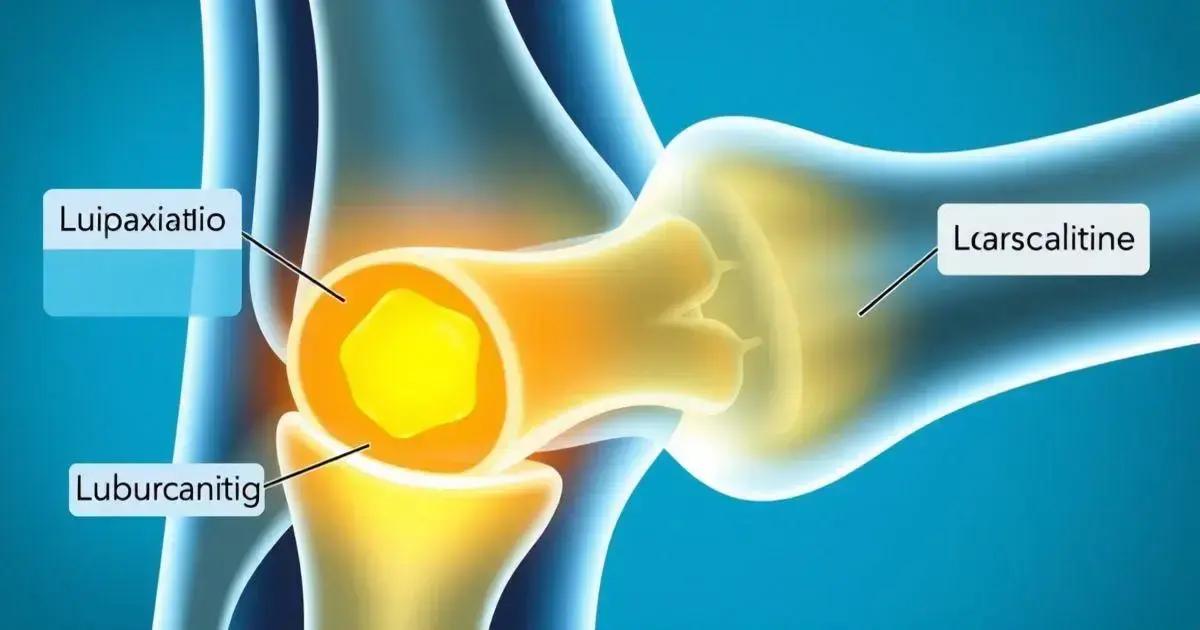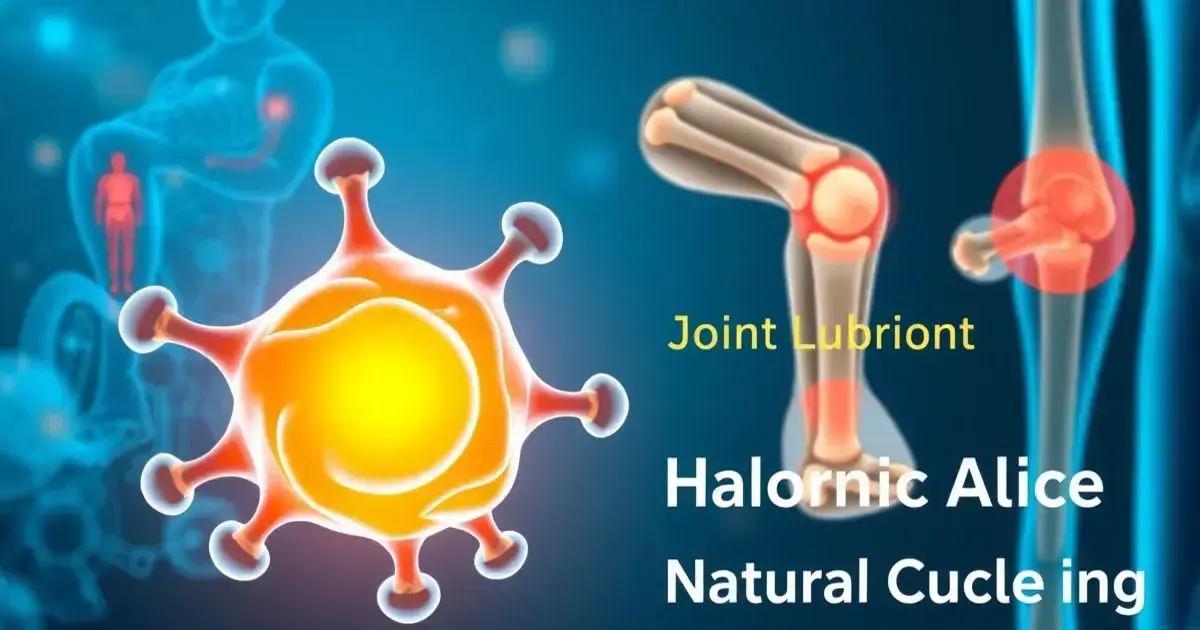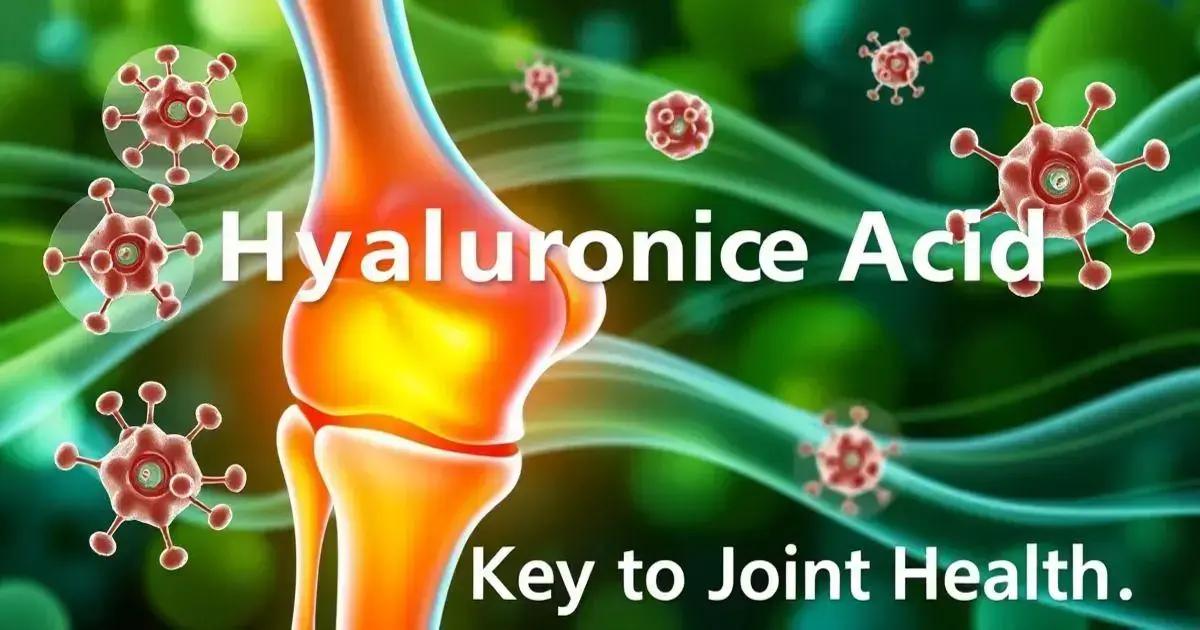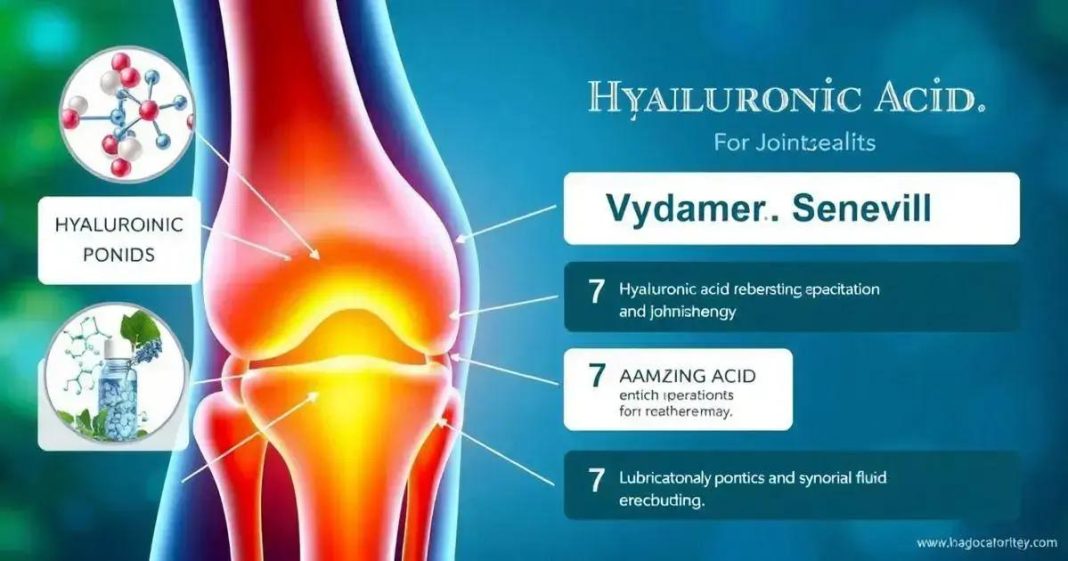Hyaluronic acid is essential for joint health, offering lubrication, reducing inflammation, and protecting cartilage, making it especially helpful for those with osteoarthritis by alleviating pain and enhancing mobility. It can be found in bone broth, leafy greens, and supplements, and incorporating these into your diet can improve joint function and overall quality of life.
Hyaluronic acid for joint health is gaining attention for its remarkable benefits. This powerful substance is naturally found in the body, particularly in connective tissues, and plays a crucial role in maintaining joint lubrication and cushioning. In this article, we’ll delve into the benefits of hyaluronic acid and how it can improve your joint health.
What is Hyaluronic Acid?
Hyaluronic acid is a naturally occurring substance in the body, primarily found in connective tissues, skin, and synovial fluid, which lubricates joints. It is a type of glycosaminoglycan, a long-chain sugar molecule that helps retain moisture and provides structural support to tissues.
One of the most remarkable features of hyaluronic acid is its ability to hold up to 1,000 times its weight in water, making it a powerful moisturizer for the skin and a crucial component for joint health. In the joints, hyaluronic acid acts as a lubricant, reducing friction between bones and helping to maintain smooth movement.
As we age, the natural production of hyaluronic acid decreases, which can lead to dry skin, reduced joint lubrication, and discomfort. This is why many people turn to hyaluronic acid supplements and treatments to support their joint health and overall well-being.
In summary, hyaluronic acid is an essential molecule that plays a vital role in maintaining hydration, elasticity, and joint function, making it a key player in promoting healthy joints and connective tissues.

How Hyaluronic Acid Benefits Joints
Hyaluronic acid offers numerous benefits for joint health, making it an essential component for those looking to maintain mobility and reduce discomfort.
Here’s how hyaluronic acid benefits your joints:
- Lubrication: Hyaluronic acid is a major component of synovial fluid, which lubricates the joints. This lubrication reduces friction between the cartilage surfaces, allowing for smoother and pain-free movement.
- Shock Absorption: The viscosity of hyaluronic acid helps absorb shock and distribute pressure evenly across the joints during physical activities, which can prevent damage and reduce the risk of injury.
- Cartilage Health: Hyaluronic acid plays a crucial role in maintaining the health of cartilage. It helps retain moisture in the cartilage, providing the necessary hydration to keep it flexible and resilient.
- Inflammation Reduction: Studies suggest that hyaluronic acid may help reduce inflammation in the joints, which can alleviate pain and improve overall joint function, particularly in individuals with conditions like osteoarthritis.
- Enhanced Healing: Hyaluronic acid promotes the repair and regeneration of joint tissues, helping to improve recovery times after injury or surgery, and supporting overall joint health.
By incorporating hyaluronic acid into your wellness routine, whether through dietary sources or supplements, you can enjoy these benefits and help support your joint health effectively. This makes it a valuable addition for anyone looking to maintain an active lifestyle.
Sources of Hyaluronic Acid
Incorporating hyaluronic acid into your diet can help support joint health and overall well-being. Here are some of the best sources of hyaluronic acid:
Bone Broth: One of the richest sources of hyaluronic acid, bone broth is made by simmering animal bones and connective tissues for an extended period. This process extracts the hyaluronic acid along with collagen and other nutrients, making it a nutritious addition to soups and stews.
Leafy Greens: Vegetables such as spinach, kale, and Swiss chard contain compounds that support the body’s production of hyaluronic acid. They are also rich in antioxidants, which can help protect joints from damage.
Root Vegetables: Foods like sweet potatoes and carrots are high in nutrients that promote the synthesis of hyaluronic acid in the body, contributing to joint health.
Fruits: Citrus fruits, berries, and avocados are not only delicious but also contain antioxidants and nutrients that can help boost hyaluronic acid levels.
Hyaluronic Acid Supplements: For those who may not get enough hyaluronic acid through food, supplements are widely available in various forms such as capsules, powders, and liquid. These can be easily integrated into your daily routine.
Animal Products: Foods such as chicken, beef, and fish, especially their skin and cartilage, contain hyaluronic acid. Consuming these can help enhance your intake naturally.
By including these sources in your diet, you can help maintain healthy levels of hyaluronic acid in your body, supporting joint health and overall functionality. Whether through food or supplements, hyaluronic acid can be a beneficial addition to your wellness routine!

Hyaluronic Acid Supplements
Hyaluronic acid supplements have gained popularity for their potential benefits in supporting joint health, skin hydration, and overall wellness. Here’s what you need to know about these supplements:
Forms of Supplements: Hyaluronic acid supplements are available in various forms, including capsules, powders, and liquid. Each form provides a convenient way to incorporate hyaluronic acid into your daily routine.
Dosage Recommendations: While there is no standardized dosage for hyaluronic acid, many studies suggest that taking between 100 to 200 mg per day can be effective for joint health. However, it’s always best to consult with a healthcare professional for personalized advice.
Potential Benefits: Research has indicated that hyaluronic acid supplements may help reduce joint pain, improve mobility, and enhance joint lubrication. Additionally, they can support skin hydration, leading to improved skin elasticity and a youthful appearance.
Safety and Side Effects: Hyaluronic acid supplements are generally considered safe for most people. However, some individuals may experience mild side effects such as gastrointestinal discomfort. Always consult a healthcare provider before starting any new supplement regimen.
Choosing Quality Supplements: When selecting hyaluronic acid supplements, look for reputable brands that provide transparent ingredient lists and third-party testing to ensure quality and potency.
Incorporating hyaluronic acid supplements into your daily routine can be an effective way to support joint health and overall well-being. By doing so, you may experience improved mobility, reduced discomfort, and enhanced hydration, helping you maintain an active and healthy lifestyle.
Hyaluronic Acid and Osteoarthritis
Osteoarthritis is a degenerative joint disease characterized by the breakdown of cartilage, leading to pain, stiffness, and reduced mobility.
Hyaluronic acid has emerged as a promising treatment option for individuals suffering from this condition. Here’s how hyaluronic acid can help:
- Joint Lubrication: Hyaluronic acid is a critical component of synovial fluid, which lubricates the joints. For people with osteoarthritis, maintaining adequate lubrication can alleviate pain and improve joint function.
- Shock Absorption: The viscosity of hyaluronic acid helps absorb impact during movement, reducing stress on the joints. This can be particularly beneficial for individuals with osteoarthritis who experience joint pain during physical activities.
- Reduction of Inflammation: Research suggests that hyaluronic acid may help reduce inflammation in the joints, leading to decreased pain and improved overall joint health for those with osteoarthritis.
- Cartilage Protection: Hyaluronic acid may play a role in protecting and preserving cartilage health, potentially slowing the progression of osteoarthritis and reducing further joint damage.
- Injections as Treatment: In addition to oral supplements, hyaluronic acid can be administered via injections directly into the affected joint. This treatment has been shown to provide significant pain relief and improved mobility in patients with osteoarthritis.
In summary, hyaluronic acid offers several benefits for individuals with osteoarthritis, including enhanced joint lubrication, reduced inflammation, and potential cartilage protection. Whether through supplements or injections, incorporating hyaluronic acid into your treatment plan may help improve quality of life and maintain mobility.

Tips for Joint Health
Maintaining healthy joints is vital for overall mobility and quality of life. Here are some practical tips to promote joint health and prevent discomfort:
Stay Active: Regular physical activity helps strengthen the muscles around the joints, providing better support and reducing the risk of injury. Aim for low-impact exercises like swimming, cycling, or walking to minimize joint stress.
Maintain a Healthy Weight: Excess weight puts additional stress on your joints, particularly those in the hips, knees, and ankles. Maintaining a healthy weight can alleviate pressure and reduce the risk of joint pain and inflammation.
Incorporate a Balanced Diet: Eating a diet rich in fruits, vegetables, whole grains, and lean proteins provides essential nutrients that support joint health. Specifically, omega-3 fatty acids found in fish, nuts, and seeds can help reduce inflammation.
Stay Hydrated: Proper hydration is crucial for joint lubrication. Aim to drink plenty of water throughout the day to keep your joints well-hydrated and functioning optimally.
Consider Supplements: If you’re not getting enough nutrients from your diet, consider supplements such as hyaluronic acid, glucosamine, and chondroitin, which may help support joint health and reduce discomfort.
Practice Good Posture: Maintaining proper posture while sitting, standing, and lifting can help reduce strain on your joints. Be mindful of your body mechanics to avoid unnecessary stress on your joints.
Listen to Your Body: Pay attention to any signs of pain or discomfort in your joints. If you experience persistent pain, consult a healthcare professional for guidance and appropriate treatment options.
By following these tips, you can help maintain joint health and reduce the risk of pain and injury. Taking proactive steps today will benefit your joints in the long run, allowing you to stay active and enjoy life to the fullest!
Conclusion
Conclusion
In conclusion, hyaluronic acid is a powerful substance that plays a vital role in supporting joint health. Its ability to provide lubrication, reduce inflammation, and protect cartilage makes it an essential component in maintaining mobility and comfort, especially for those suffering from conditions like osteoarthritis. By incorporating hyaluronic acid through dietary sources, supplements, and other means, you can enhance your joint health and overall quality of life.
Additionally, adopting a balanced diet, staying active, maintaining a healthy weight, and practicing good joint care can further contribute to joint longevity. Prioritizing joint health today will help you stay active and enjoy a fulfilling lifestyle for years to come.
Conclusion
In conclusion, hyaluronic acid is a powerful substance that plays a vital role in supporting joint health. Its ability to provide lubrication, reduce inflammation, and protect cartilage makes it an essential component in maintaining mobility and comfort, especially for those suffering from conditions like osteoarthritis.
By incorporating hyaluronic acid through dietary sources, supplements, and other means, you can enhance your joint health and overall quality of life.
Additionally, adopting a balanced diet, staying active, maintaining a healthy weight, and practicing good joint care can further contribute to joint longevity. Prioritizing joint health today will help you stay active and enjoy a fulfilling lifestyle for years to come.
FAQ – Frequently Asked Questions about Hyaluronic Acid and Joint Health
What is hyaluronic acid and its role in joint health?
Hyaluronic acid is a naturally occurring substance that lubricates and cushions joints, helping to reduce friction and maintain smooth movement.
How can hyaluronic acid benefit individuals with osteoarthritis?
Hyaluronic acid can provide lubrication, reduce inflammation, and protect cartilage, potentially alleviating pain and improving joint function in osteoarthritis patients.
What are the best dietary sources of hyaluronic acid?
The best sources include bone broth, leafy greens, root vegetables, citrus fruits, and animal products like chicken and fish.
Are hyaluronic acid supplements effective?
Yes, research suggests that hyaluronic acid supplements can help reduce joint pain and improve mobility, especially for those with osteoarthritis.
What dosage of hyaluronic acid supplements is recommended?
While there is no standardized dosage, many studies suggest taking between 100 to 200 mg per day. It’s best to consult a healthcare professional for guidance.
Are there any side effects associated with hyaluronic acid supplements?
Hyaluronic acid supplements are generally considered safe, but some individuals may experience mild gastrointestinal discomfort. Always consult with a healthcare provider before starting any new supplement.


